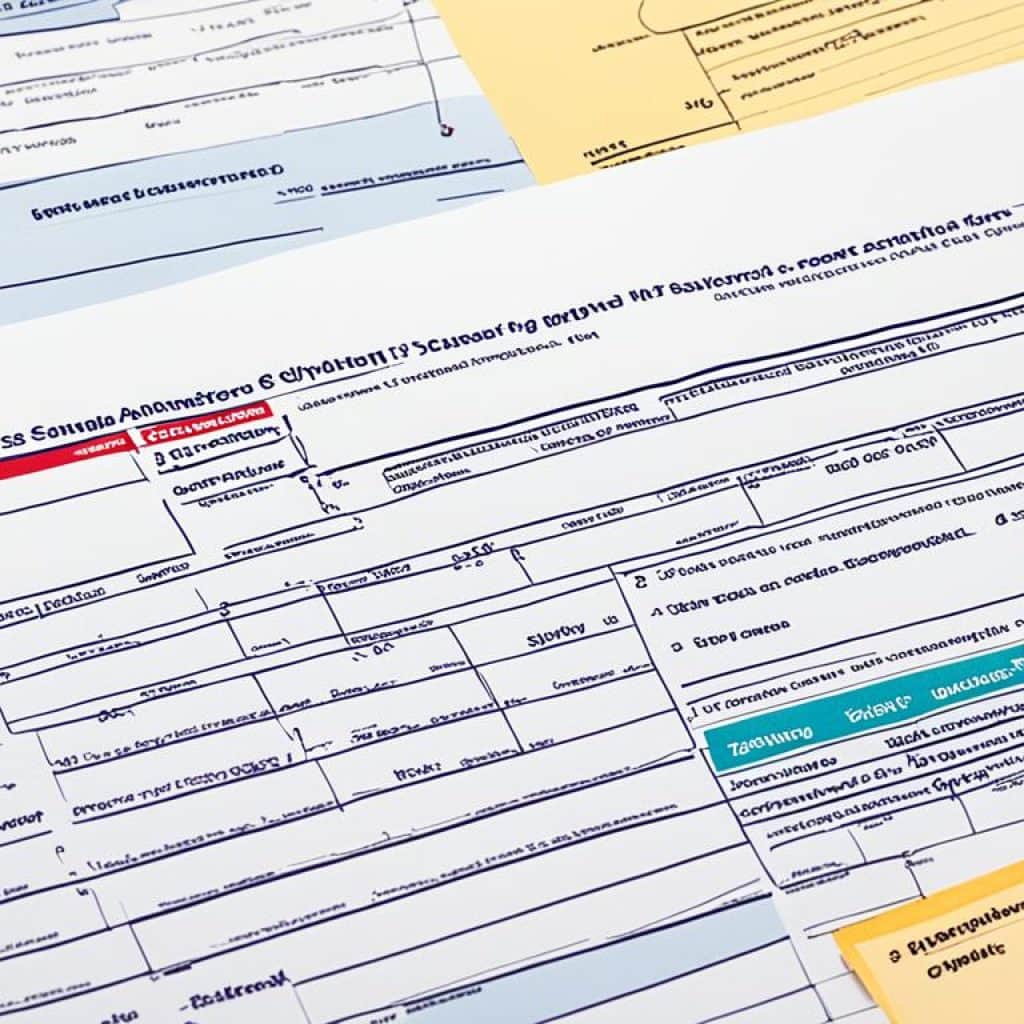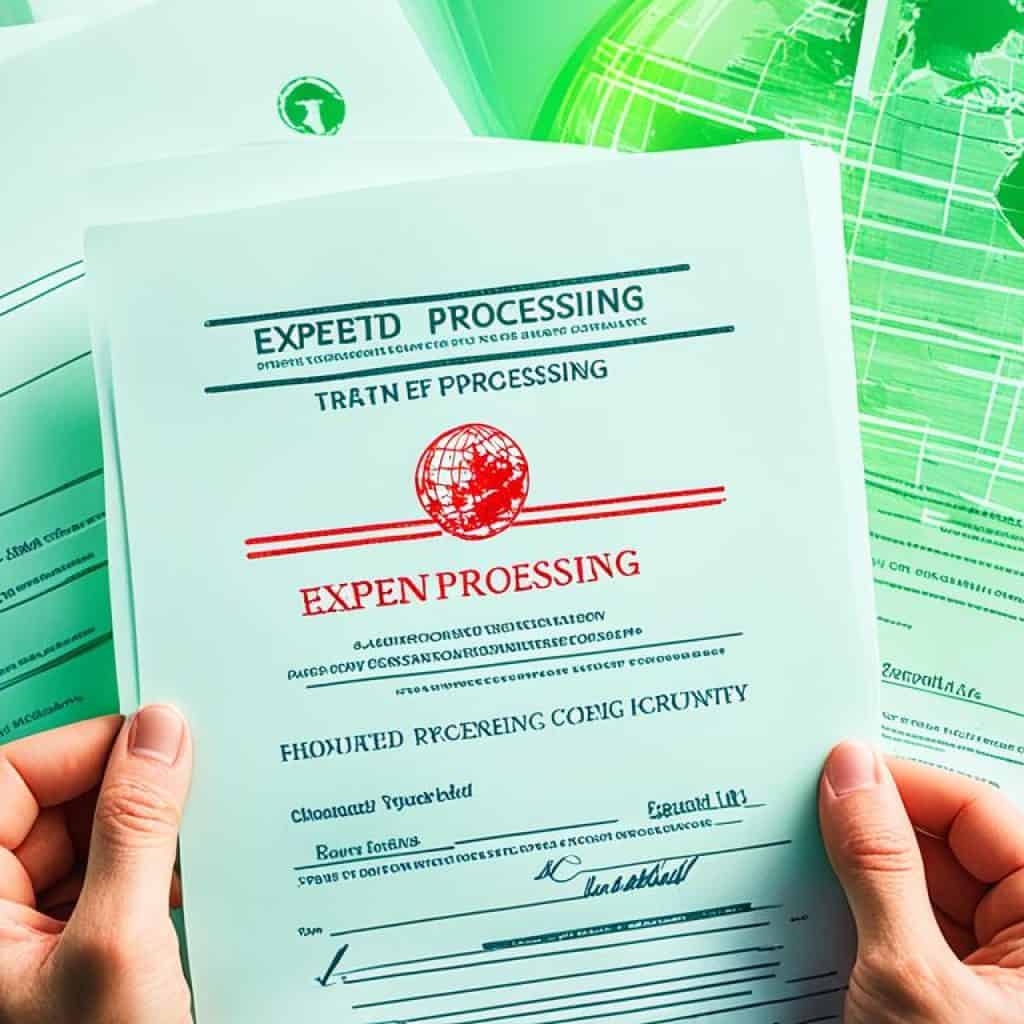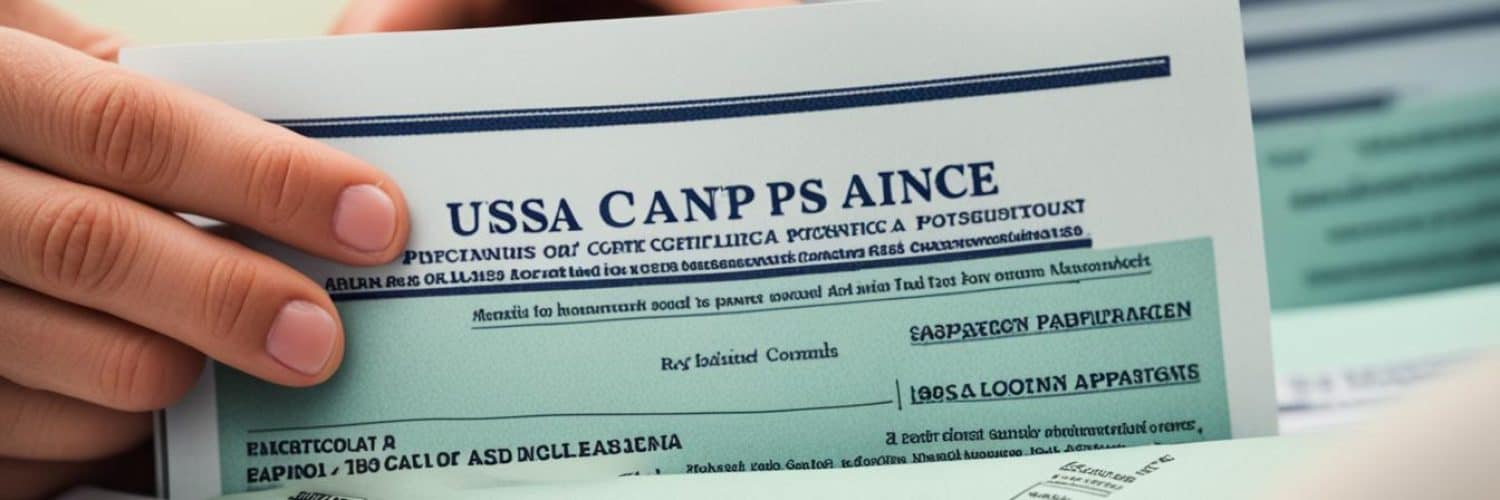Are you planning to bring your foreign fiancé or fiancée to the United States for marriage and permanent residency? The Fiance Visa USCIS process can be complex, involving multiple steps and requirements. But don’t fret! With the right guidance and understanding, you can simplify your journey and navigate the process with confidence.
Applying for a Fiance Visa with USCIS is the first step in bringing your loved one to the United States. From filing the necessary forms to undergoing background checks, each phase of the process is crucial in ensuring a successful outcome.
But what are the requirements for a Fiance Visa? How does the Fiance Visa process unfold? And what are the common pitfalls you should avoid? In this article, we’ll dive into the details of the Fiance Visa USCIS process, providing you with the essential information you need to know.
Key Takeaways:
- Applying for a Fiance Visa involves multiple steps and requirements.
- The petitioner must demonstrate eligibility and intention to marry within 90 days of the foreign national’s admission to the United States.
- The Fiance Visa process includes USCIS review, background checks, consular processing, and a visa interview.
- After marriage, the foreign spouse can apply for Adjustment of Status to obtain lawful permanent residency (Green Card).
- Professional guidance from a Fiance Visa lawyer can greatly assist throughout the application process.
Fiance Visa Requirements
In order to obtain a Fiance Visa, there are specific requirements that the U.S. citizen petitioner must meet. These requirements are put in place to ensure that both parties are eligible to marry and that the intention to marry is genuine. Here are the key requirements for a Fiance Visa:
- Freedom to Marry: The petitioner must demonstrate that both the U.S. citizen and the foreign national are legally free to marry. This involves providing evidence of the termination of any previous marriages, such as divorce decrees or death certificates.
- Intent to Marry: It is crucial to show that both parties have a genuine intention to marry within 90 days of the foreign national’s admission to the United States. This can be supported by providing a written statement of intent to marry and evidence of wedding preparations.
- Physical Meeting Requirement: The petitioner must prove that they have met their foreign fiancé(e) in person at least once within the past two years. Documentation such as photographs, travel itineraries, or boarding passes can be included as evidence of the meeting.
- Supporting Documents: To strengthen the Fiance Visa application, the petitioner must provide supporting documents that verify the relationship. This can include photographs together, communication records, and affidavits from friends and family who can attest to the authenticity of the relationship.
- Affidavit of Support: The petitioner must also demonstrate the ability to financially support the foreign fiancé(e) by submitting an affidavit of support. This legally binding document ensures that the foreign national will not become a public charge and relies on the petitioner’s income and assets to meet the financial requirements.
Meeting these Fiance Visa requirements is crucial to the success of the application. It is essential to gather all the necessary documents and evidence to support the relationship and provide proof of eligibility. Working with an experienced immigration attorney can help navigate the process and ensure that all requirements are met thoroughly.
“By meeting the Fiance Visa requirements and submitting a complete and well-documented application, you increase your chances of a successful outcome and a smooth journey towards starting your life together in the United States.”
Fiance Visa Requirements
| Requirement | Description |
|---|---|
| Freedom to Marry | The petitioner must provide evidence of the termination of any previous marriages. |
| Intent to Marry | Both parties must demonstrate a genuine intention to marry within 90 days of admission to the United States. |
| Physical Meeting Requirement | The petitioner must prove that they have met their foreign fiancé(e) in person within the past two years. |
| Supporting Documents | The petitioner must provide evidence to support the authenticity of the relationship, such as photographs, communication records, and affidavits. |
| Affidavit of Support | The petitioner must submit an affidavit of support to prove their ability to financially support the foreign fiancé(e). |
Fiance Visa Process
The Fiance Visa process involves several essential steps that must be followed diligently to ensure a successful outcome. Understanding the Fiance Visa timeline, interview process, and application form requirements is crucial for a smooth and efficient journey.
Once the U.S. citizen petitioner files the Form I-129F with USCIS, the petition undergoes a thorough review, including background checks on both individuals. This step is vital in determining the eligibility of the couple to proceed with the Fiance Visa application.
After USCIS approves the petition, it is transferred to the National Visa Center for further processing. During this stage, the foreign fiancé(e) will be required to attend a Fiance Visa interview at a U.S. Embassy or Consulate in their home country.
At the Fiance Visa interview, the applicant must provide various documents to establish the validity of their relationship, such as photographs, communications, and evidence of meeting in person. Additionally, a medical examination is conducted to ensure the applicant’s health meets the necessary requirements for immigration.
If the Fiance Visa application is approved, the visa will be valid for up to six months from the date of issuance. It is crucial for the fiancé(e) to enter the United States within this timeframe. Once in the U.S., the couple has 90 days to marry, as per the Fiance Visa requirements.

| Fiance Visa Process Steps | Description |
|---|---|
| 1. File Form I-129F | The U.S. citizen petitioner submits the Form I-129F to USCIS, providing details about the relationship and intention to marry. |
| 2. USCIS Review and Background Checks | USCIS reviews the petition and conducts background checks on both the U.S. citizen petitioner and the foreign fiancé(e). |
| 3. Approval and Case Transfer | If the petition is approved, it is transferred to the National Visa Center for further processing. |
| 4. Fiance Visa Interview | The foreign fiancé(e) attends a visa interview at a U.S. Embassy or Consulate, providing evidence of the relationship and undergoing a medical examination. |
| 5. Visa Issuance and Entry to the U.S. | If approved, the Fiance Visa is issued, allowing the fiancé(e) to enter the United States within the authorized timeframe. |
| 6. Marriage within 90 Days | Once in the U.S., the couple has 90 days to get married and proceed with the subsequent adjustment of status process. |
While navigating through the Fiance Visa process might seem overwhelming, proper preparation, attention to detail, and adherence to the necessary timelines and application requirements can significantly simplify the journey. Seek guidance from experienced professionals to ensure a smooth and successful Fiance Visa application process.
Adjustment of Status
Once the marriage takes place, the foreign national spouse must begin the process of adjusting their status to obtain lawful permanent residency, also known as a Green Card. This allows them to live and work permanently in the United States. The Adjustment of Status is a crucial step in the journey towards building a life together in the U.S.
To initiate the Adjustment of Status, the foreign national spouse must file Form I-485, Application to Register Permanent Residence or Adjust Status, with the U.S. Citizenship and Immigration Services (USCIS). This form serves as the official request for the change in immigration status.
The Form I-485 application requires detailed information about the foreign national spouse, including biographical data, immigration history, and criminal records. It also involves providing supporting documents, such as marriage certificates, birth certificates, passport copies, and photographs.
Submitting a complete and accurate Form I-485 package is essential to ensure a smooth processing experience. Any errors or omissions could lead to delays or even rejection of the application. It is advisable to seek professional guidance from an experienced Fiance Visa lawyer to assist with the preparation and submission of the Form I-485, maximizing the chances of a successful outcome.
Conditional Permanent Resident Status
If the Adjustment of Status application is approved, the foreign national spouse will be granted conditional permanent resident status. This status is valid for a period of two years. During this time, the couple must continue to fulfill the obligations of their marriage, living together as a bona fide married couple.
In order to remove the conditions on their residency, the conditional resident spouse must file a joint petition to remove conditions (Form I-751) within 90 days before the expiration of the two-year period. This petition serves as evidence that the marriage is genuine and not solely for the purpose of immigration benefits.
Upon approval of the joint petition, the foreign national spouse will receive a permanent Green Card, which grants them unrestricted lawful permanent residency in the United States.
Benefits of Adjustment of Status
The Adjustment of Status process offers several advantages for the foreign national spouse. These benefits include:
- Ability to live and work legally in the United States
- Access to various government benefits, such as healthcare and social security
- Opportunity to pursue educational opportunities and apply for financial aid
- Potential eligibility for U.S. citizenship through naturalization
- Protection against deportation or removal from the United States
By obtaining a Green Card through Adjustment of Status, the foreign national spouse can begin building a stable and prosperous future in the United States, enjoying the rights and privileges that come with permanent residency.
| Pros | Cons |
|---|---|
| Access to work and live legally in the U.S. | Complex application process |
| Eligibility for government benefits and educational opportunities | Possible delays in processing times |
| Potential path to U.S. citizenship through naturalization | Obligation to maintain a bona fide marital relationship |
| Protection against deportation or removal | Requirement to file joint petition to remove conditions |
Consular Processing
Consular processing plays a crucial role in the K-1 visa application process, ensuring that all necessary steps are taken by the U.S. Embassy or Consulate to review and evaluate the application. This comprehensive procedure involves conducting meticulous background checks, scheduling a visa interview, and carefully scrutinizing the documents provided by the foreign fiancé(e) to establish the authenticity and validity of the relationship.
One of the key elements of consular processing is the K-1 visa interview, an essential step in determining the eligibility of the foreign fiancé(e) for entry into the United States. This interview provides an opportunity for the consular officer to assess the credibility and genuineness of the relationship. It is crucial for the fiancé(e) to be well-prepared for the interview to ensure a smooth and successful experience.
Image:

During the interview, the consular officer may ask a range of questions to verify the relationship and assess the intentions of the couple. These questions may cover various aspects, such as how the couple met, their future plans, and their knowledge of each other’s background and personal details. It is essential for the fiancé(e) to answer truthfully and confidently, providing clear and concise responses.
To ensure a smooth K-1 visa interview, thorough preparation is crucial. The couple should review and gather all necessary documents to support their relationship, such as photographs, communication records, and evidence of joint activities or financial commitments. It is also important to familiarize oneself with the specific requirements and guidelines provided by the U.S. Embassy or Consulate where the interview will be conducted.
In summary, consular processing is a critical step in the K-1 visa application process, involving background checks, document reviews, and the essential K-1 visa interview. With careful preparation and thorough understanding of the requirements, couples can navigate through this stage successfully, ensuring a smooth journey towards obtaining the K-1 visa and starting their life together in the United States.
Processing Times and Factors Affecting Them
Fiance Visa processing times can vary widely, depending on several factors that influence the overall timeline. Understanding these factors can help applicants manage their expectations and navigate the process more effectively.
Factors Affecting Fiance Visa Processing Times:
- The applicant’s home country: Each country has its own unique processing times, which can be influenced by various factors such as the volume of applications and the efficiency of the local U.S. Embassy or Consulate.
- The workload at USCIS: The processing times can also be affected by the workload at the USCIS office handling the Fiance Visa applications. Higher volumes of applications may result in longer wait times.
- The speed of the foreign fiancé(e): The processing times can be influenced by how quickly the foreign fiancé(e) completes their part of the application process. Promptly providing required documents and responding to any requests for additional information can help expedite the process.
It is important to note that while there are general estimates of processing times available, these are not definitive and can be subject to change. USCIS periodically publishes updated processing time information on their website, but it is advisable to consult with an immigration attorney or check the USCIS website for the most accurate and up-to-date information.
To minimize the processing time and increase the chances of a smooth and efficient application process, it is crucial to handle the application with efficiency and provide accurate information. Following the instructions carefully, submitting all required documents, and promptly responding to any requests from USCIS can help reduce overall wait times.
Why Fiance Visa Processing Times Matter
Understanding the processing times is essential for planning the next steps in the immigration journey. Applying for a Fiance Visa involves careful preparation and coordination, including travel arrangements, wedding planning, and other important life decisions. By having an idea of the expected processing times, applicants can better manage their timelines and make informed decisions.
It’s important to be patient throughout the process and remain proactive in gathering the necessary documents and information. While delays can be frustrating, keeping an open line of communication with USCIS and following up on the application status can help ensure progress is being made.
In the words of Benjamin Franklin, “By failing to prepare, you are preparing to fail.” This sentiment holds true when it comes to navigating the Fiance Visa process. Taking the time to understand the factors that affect processing times and diligently preparing the application can help reduce wait times and increase the chances of a successful outcome.
Common Pitfalls in the Fiance Visa Application Process
When applying for a Fiance Visa, it is important to be aware of the common pitfalls that can hinder your application. By avoiding these mistakes, you can increase your chances of a successful outcome and ensure a smoother process overall. Here are some of the key pitfalls to watch out for:
- Filing incomplete or inaccurate applications: One of the most crucial steps in the Fiance Visa application process is completing the necessary forms accurately and providing all required documentation. Incomplete or inaccurate applications can result in delays or even denial of your visa.
- Failing to comply with timelines: The Fiance Visa process has specific timelines and deadlines that must be followed. Failure to submit documents or complete required steps within the allotted time can lead to delays or complications in your application.
- Providing misleading information: It is essential to provide truthful and accurate information throughout the application process. Misleading or false information can not only result in the denial of your visa but can also have more severe consequences, such as immigration fraud charges.
- Attempting to expedite the process through dishonest means: Cutting corners or attempting to expedite the Fiance Visa process through dishonest means is not only unethical but can also have serious legal consequences. It is important to follow the specified processes and stay within the legal boundaries to ensure a successful and lawful application.
By avoiding these common pitfalls and adhering to the requirements and guidelines set forth by USCIS, you can navigate the Fiance Visa application process with confidence and increase your chances of a positive outcome.
Mistakes to Avoid:
“It is imperative to thoroughly review your application before submission to ensure accuracy and completeness. Pay attention to the details and do not rush through the process. Being diligent and proactive can save you time and prevent unnecessary complications.” – Jane Smith, Immigration Attorney
Remember, your Fiance Visa application is an important step towards building your future together in the United States. Taking the time to avoid these common pitfalls can help you start this exciting chapter of your life on the right foot.
Importance of Professional Guidance in Fiance Visa Application
Applying for a Fiance Visa can be a complex and daunting process. The intricacies of immigration laws and procedures require careful attention to detail and thorough understanding. This is where the importance of professional guidance from a Fiance Visa lawyer comes into play. A seasoned attorney can provide invaluable expertise and support throughout the application process, ensuring that everything is handled accurately and efficiently.
The Benefits of Hiring a Fiance Visa Lawyer
One of the key advantages of working with a Fiance Visa lawyer is their in-depth knowledge and experience in the field. They are well-versed in the nuances of the application process and can guide you through each step, ensuring that all necessary documents are included and that the application is in compliance with the requirements set by USCIS.
A lawyer can provide personal attention and tailor their guidance to your specific case. They can assess your unique circumstances, identify any potential issues or challenges, and develop strategies to address them effectively. With their extensive network and resources, they can access the most up-to-date information, helping to streamline the application process.
Preparing for the Fiance Visa interview can be a nerve-wracking experience. However, with a Fiance Visa lawyer on your side, you can receive expert advice and practice sessions to boost your confidence and ensure that you are fully prepared to answer any questions that may arise during the interview.
Furthermore, unforeseen complications or issues can arise during the application process. Whether it’s responding to a request for evidence or navigating legal obstacles, a Fiance Visa lawyer can provide invaluable assistance. They have the expertise to handle any challenges that may arise, increasing the likelihood of a successful outcome and avoiding unnecessary delays or denials.
Ultimately, the guidance and support of a Fiance Visa lawyer can give you peace of mind and confidence that your application is being handled by a professional with your best interests in mind. They can help you navigate the complexities of the process, ensuring that your application is strong and well-presented, and maximizing your chances of a successful outcome.
Comparing the Benefits of Professional Guidance
| Benefits | Professional Guidance | No Professional Guidance |
|---|---|---|
| Knowledge and Experience | Extensive understanding of immigration laws and procedures | Limited knowledge and understanding |
| Personalized Assistance | Tailored guidance based on individual circumstances | No personalized support |
| Interview Preparation | Expert advice and practice sessions to boost confidence | Limited knowledge of the interview process |
| Issue Resolution | Expert handling of complications or legal obstacles | No professional assistance in resolving issues |
| Peace of Mind | Confidence that the application is being handled by a professional | Uncertainty and potential stress |
As the table demonstrates, professional guidance from a Fiance Visa lawyer offers numerous advantages over navigating the application process alone. With their expertise and support, you can navigate the complexities with ease and increase the chances of a successful Fiance Visa application.
Having a skilled attorney on your side means having a trusted advisor and advocate throughout the entire process. Their dedication and commitment to your case can make a significant difference in the outcome of your Fiance Visa application. Don’t underestimate the importance of professional guidance when it comes to such a life-changing decision.
Expedited Processing of Fiance Visa Application
In some cases, individuals may require expedited processing for their Fiance Visa applications. While expedited processing is not guaranteed, certain circumstances may warrant a request for a faster review. These circumstances can include medical emergencies, humanitarian reasons, or situations involving compelling national interest. Each case is evaluated on an individual basis, and it is vital to consult with a Fiance Visa lawyer to determine if expedited processing may be applicable in your specific situation.
Expedited processing for a Fiance Visa application involves requesting special consideration for an expedited review of your case. The specific requirements for expedited processing may differ based on the circumstances involved.
It’s important to note that not all requests for expedited processing are granted, and the decision ultimately rests with the government agency involved. Therefore, it is crucial to provide compelling and well-documented reasons for expedited processing, supported by relevant evidence and documentation. Consulting with an experienced Fiance Visa lawyer can help you navigate this process and increase your chances of a successful outcome.
Factors Considered for Expedited Processing
When considering a request for expedited processing, the government authorities assess the following factors:
- Medical emergencies: If the foreign fiancé(e) is facing a serious health condition or requires urgent medical treatment that cannot be reasonably delayed, expedited processing may be warranted. Medical documentation will be required to support this claim.
- Humanitarian reasons: In exceptional cases where there is a pressing humanitarian need, such as the imminent danger to the life or safety of the foreign fiancé(e), expedited processing may be considered. Evidence of the humanitarian situation must be provided.
- Compelling national interest: Situations involving compelling national interest, such as cases related to national security or substantial public benefit, may be eligible for expedited processing. However, such circumstances are rare and require strong supporting evidence to demonstrate the significance of the national interest involved.
It’s important to understand that expedited processing is not intended for general convenience or personal preference. Genuine and compelling reasons must be demonstrated to justify the need for expedited consideration.
| Advantages of Expedited Processing | Disadvantages of Expedited Processing |
|---|---|
|
|
It’s important to weigh the advantages and disadvantages of expedited processing before making a request. Consulting with a knowledgeable Fiance Visa lawyer can help you assess your eligibility for expedited processing and guide you through the necessary steps and requirements.

Next Steps After Obtaining a Fiance Visa
Now that you have successfully obtained a Fiance Visa, it’s time to take the next steps towards starting your life together in the United States. The following are the key actions to keep in mind:
Tie the Knot within 90 Days
One of the first and most important tasks after obtaining a Fiance Visa is to get married within 90 days of entering the United States. This timeline is crucial as it ensures compliance with the visa requirements. Remember, the clock starts ticking from the moment your fiancé(e) arrives in the country.
Apply for Adjustment of Status
Once you’re officially married, the next step is to apply for Adjustment of Status to obtain lawful permanent residency, also known as a Green Card. This process allows your spouse to live and work in the United States permanently. To initiate this, you need to file Form I-485, Application to Register Permanent Residence or Adjust Status, with U.S. Citizenship and Immigration Services (USCIS).
Completing the Form I-485 accurately and including all the required supporting documents is crucial. This includes proof of the bona fide nature of your marriage and evidence of financial support. Providing comprehensive and well-documented information greatly increases your chances of a successful application.
Follow the Required Steps and Timelines
As you navigate through the Adjustment of Status process, it’s important to be aware of the required steps and timelines. Keep track of crucial dates, such as the expiration date on your Fiance Visa and the deadline to file your Adjustment of Status application. Failing to meet these deadlines can have serious consequences, including loss of legal immigration status.
Remember, obtaining a Fiance Visa is just the beginning of your journey. By following the necessary steps and fulfilling the requirements for Adjustment of Status, you can create a strong foundation for your future together in the United States.
Benefits of Hiring a Fiance Visa Lawyer
Applying for a Fiance Visa can be a complex and intricate process, and having the guidance of a knowledgeable Fiance Visa lawyer can greatly benefit your case. Here are some of the advantages of hiring a lawyer to assist you throughout the application process:
- Expertise in Forms and Documentation: A Fiance Visa lawyer is well-versed in the required forms and documentation. They can ensure that all paperwork is completed accurately and submitted on time. This attention to detail can prevent delays and improve the chances of a successful outcome.
- Guidance on Interview Preparation: The interview is a crucial part of the Fiance Visa process. A lawyer can provide valuable guidance on how to prepare for the interview, including what questions to expect and how to present your case in the best possible light. Their expertise can help alleviate any anxiety and increase your confidence during the interview.
- Legal Issue Navigation: If any complex legal issues arise during the application process, a Fiance Visa lawyer can navigate through them effectively. They can analyze your situation, identify potential challenges, and develop strategies to overcome them. Having a lawyer by your side can empower you to address any hurdles confidently.
- Protection of Rights and Interests: A Fiance Visa lawyer is dedicated to protecting your rights and interests throughout the application process. They will advocate for you and ensure that your case is handled fairly. Their expertise can help safeguard your best interests and increase the likelihood of a successful outcome.
By hiring a Fiance Visa lawyer, you can alleviate the stress and uncertainties that come with navigating the application process on your own. Their knowledge, experience, and commitment to your case can streamline the process and improve your chances of obtaining a Fiance Visa efficiently and successfully.
Conclusion
The Fiance Visa USCIS process can be complex and challenging, but with the right guidance and understanding of the requirements, it can be simplified. By following the necessary steps, avoiding common pitfalls, and seeking professional assistance when needed, you can streamline your journey towards obtaining a Fiance Visa and starting your life together in the United States.
The Fiance Visa application process involves multiple stages, starting with the filing of Form I-129F with USCIS. It requires demonstrating eligibility to marry and providing supporting documents. Once approved, the case progresses to consular processing, where the foreign fiancé(e) attends a visa interview. After the visa is issued, the couple must marry within 90 days and apply for Adjustment of Status to obtain lawful permanent residency (Green Card).
Throughout the process, it is crucial to pay attention to processing times and factors that may affect them. Efficient handling of the application and providing accurate information can help reduce wait times. Additionally, it is important to avoid common pitfalls that may result in application denial or delays. Seeking professional guidance from a Fiance Visa lawyer can provide valuable assistance in navigating the complexities of the application process and increasing the chances of a successful outcome.
FAQ
What is the Fiance Visa USCIS process?
The Fiance Visa USCIS process involves filing Form I-129F, Petition for Alien Fiance(e), with USCIS. This form establishes that both parties are eligible to marry and intend to marry within 90 days of the foreign national’s admission to the United States. Background checks are conducted, and if approved, the case is sent to the National Visa Center for further processing.
What are the requirements for a Fiance Visa?
The requirements for a Fiance Visa include both parties being free to marry, intending to marry within 90 days of entry into the United States, and having met in person within the past two years. The U.S. citizen petitioner must provide supporting documents, such as proof of relationship and financial support through an affidavit of support.
What is the Fiance Visa process?
The Fiance Visa process involves filing Form I-129F with USCIS, undergoing background checks, and submitting additional documents to the National Visa Center. The foreign fiancé(e) then attends a visa interview at a U.S. Embassy or Consulate, providing proof of the relationship and undergoing a medical examination. If approved, the fiancé(e) must enter the United States within six months and marry their U.S. citizen petitioner within 90 days.
What is Adjustment of Status?
Adjustment of Status refers to the process of obtaining a Green Card (lawful permanent residency) after marrying a U.S. citizen on a Fiance Visa. The foreign national spouse must file Form I-485 with USCIS to apply for Adjust Status. If approved, the spouse will be granted conditional permanent resident status for two years and must petition to remove these conditions within 90 days of the residency period’s end.
What is Consular Processing?
Consular processing involves the steps taken by a U.S. Embassy or Consulate to process the K-1 visa application. This includes conducting background checks, scheduling a visa interview, and reviewing the documents provided by the foreign fiancé(e) to establish the validity of the relationship.
How long does the Fiance Visa process take?
Fiance Visa processing times can vary based on factors such as the applicant’s home country, USCIS workload, and the timely completion of required steps by the foreign fiancé(e). While there are estimated processing times, these are not definitive and subject to change. Properly completing the application and providing accurate information can help reduce wait times.
What are common pitfalls in the Fiance Visa application process?
Common pitfalls in the Fiance Visa application process include filing incomplete or inaccurate applications, not complying with timelines, and providing misleading information. Attempting to expedite the process through dishonest means can lead to denial, delays, or penalties. Following the legal process and providing truthful information increases the chances of a successful application.
How important is professional guidance in the Fiance Visa application process?
Professional guidance from a Fiance Visa lawyer can be vital in navigating the complexities of the application process. An experienced lawyer can ensure accurate completion of forms, provide interview preparation guidance, and assist with any unforeseen issues. They can also help protect rights and interests, increasing the chances of a successful outcome.
Is expedited processing available for the Fiance Visa application?
While there is no guarantee of expedited processing, certain circumstances like medical emergencies, humanitarian reasons, or compelling national interest may warrant a request. Individual evaluation of each case is necessary, and consulting with a Fiance Visa lawyer can help determine if expedited processing may be applicable.
What are the next steps after obtaining a Fiance Visa?
After obtaining a Fiance Visa, the next step is to marry within 90 days of entry into the United States. Once married, the foreign national spouse can apply for Adjustment of Status by filing Form I-485 with USCIS to obtain lawful permanent residency (Green Card).
What are the benefits of hiring a Fiance Visa lawyer?
Hiring a Fiance Visa lawyer can provide numerous benefits throughout the application process. A lawyer ensures accurate completion of required forms and documentation, provides guidance on interview preparation, navigates complex legal issues, and protects rights and interests, increasing the chances of a successful outcome.








Add comment